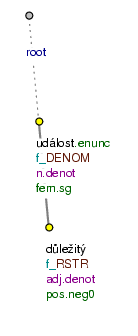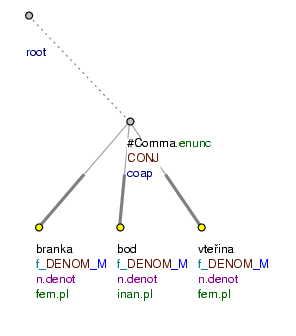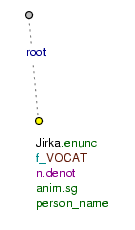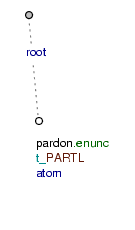-
nominative clauses.
The governing node of a nominative clause is a noun in the nominative (and other forms with the same function; see further).
For example:
Praha.
-
vocative clauses.
The governing node of a vocative clause is a noun in the vocative.
For example:
Milá Pavlíno! (=Dear Pavlina!)
-
interjectional clauses.
The governing node of an interjectional clause is an interjection or a yes-no particle.
For example:
Ach. (=Oh)
Ano. (=Yes)
Nominative clauses. The effective root node of a nominative clause is a node representing the governing noun in the (syntactic) nominative.
If the nominative clause is an independent clause, the effective root node gets the DENOM functor (see Section 1.2, "DENOM"). If the independent nominative clause is a parenthesis, its effective root node has the PAR functor (see Section 1.5, "PAR").
In those special cases when the nominative clause is a dependent clause, the effective root node gets a functor according to the relation of the clause to its governing node. These are cases of the nominative clause used as direct speech (see Section 3, "Direct speech") or the nominative of identity (see Section 8, "Identifying expressions"). See also Section 4.3, "Connecting verbal and non-verbal clauses".
The governing node of a nominative clause is not necessarily a noun in the nominative; it can also be another expression with the same function. The effective root node of a nominative clause can be a node representing:
-
a noun in the nominative.
Examples:
Důležitá událost.
DENOM(=lit. Important event) Fig. 6.28Branky.
DENOM, body.DENOM, vteřiny.DENOM(=lit. Goals, points, seconds) Fig. 6.29 -
traditional adjectives, numerals, pronouns in the nominative.
These are expressions belonging to semantic nouns at the tectogrammatical level; their
semposattribute is assigned one of the values for semantic nouns (see Section 3.1, "Thesemposattribute").Examples:
Vltavská.
DENOM1989.
DENOMOn.
DENOMa ona.DENOM(=He and she) -
genitive following a numeral.
These are cases in which the governing node is the node representing the counted object (the noun in the genitive), not the numeral in the nominative (see Section 10.1.1, "Numerals with the role of an attribute (
RSTR)").Example:
10 let.
DENOM(=10 years.GEN) -
an abbreviation.
Examples:
čtk.
DENOMVáclav N.
DENOM. junior. -
meta-language uses of certain expressions and foreign-language expressions.
For the annotation rules, see Section 9, "Foreign-language expressions" and Section 8, "Identifying expressions".
Example:
van Beethoven. [ van_Beethoven.
DENOM] -
a newly established node for a foreign-language expression (the
#Fornt-lemma).For the annotation rules for foreign-language expressions, see Section 9, "Foreign-language expressions".
Example:
New York {
#Forn.DENOM} -
a newly established node for an identifying expression (the
#Idpht-lemma).For the annotation rules for identifying expressions, see Section 8, "Identifying expressions".
Example:
Jiráskovo Proti všem {
#Idph.DENOM} (=Jirásek's Proti všem) -
a newly established node for the governing noun.
The governing node (syntactic nominative) can be ellided in the surface form of the sentence. Then, following the rules in Section 12.1.2, "Ellipsis of the governing noun", a new node is inserted into the structure in the position of the effective root node of the nominative clause. In case of grammatical ellipsis the newly established node has the
#EmpNount-lemma.Example:
(Zázrak? Omyl?) Ani jedno.
DENOM, ani druhé {#EmpNoun.DENOM} (=(Miracle? Mistake?) lit. Neither one, nor the_other)NB! In cases of ellipsis, it is necessary to consider carefully whether the ellided element (governing node) is a noun or verb. In unclear cases, the preferred option is the ellipsis of a verb.
NB! Key words without morphology are taken to be nominative clauses. Key words in a sequence of key words, separated by punctuation or connectives, are represented either as being in coordination, or apposition (cf. Fig. 6.29). These sequences are to be distinguished from constructions in which a punctuation mark between two nouns in the nominative case is a predicate in fact and which are thus considered verbal (e.g. Mladost - radost, cf. Section 4.1, "Verbal clauses").
Vocative clauses. The effective root node of a vocative clause is a node representing the vocative.
The effective root node of a vocative clause has the functor VOCAT (see Section 1.3, "VOCAT"); an exception are the cases in which the vocative clause is in the position of the nominative of identity (see Section 8, "Identifying expressions"). See also Section 4.3, "Connecting verbal and non-verbal clauses".
Examples:
Jirko.VOCAT (=Jirka!) Fig. 6.30
Občane.VOCAT , chceš dýchat čistý vzduch a mít také teplo? (=Citizen! Do you want to breathe fresh air...?)
Zeptali se: Občane.VOCAT , chceš dýchat čistý vzduch a mít také teplo? (=They asked: Citizen! ..)
nápis Občane.ID (=The sign: Citizen!)
Interjectional clauses. The effective root node of an interjectional clause is a node representing an interjection or particle (ano (=yes), ne (=no), nikoli (=no)).
The effective root node of an interjectional clause has the functor PARTL (see Section 1.4, "PARTL"); an exception are the cases in which the interjectional clause is in the position of the nominative of identity (see Section 8, "Identifying expressions"). See also Section 4.3, "Connecting verbal and non-verbal clauses".
Examples:
Pardon.PARTL Fig. 6.31
Ano.PARTL (=Yes)
Aha.PARTL (=I see)
Haló.PARTL , tady jsem. (=Hello, here I am)
nápis Aha.ID (=the notice: I see)
NB! If the interjection has the function of a verbal predicate, the clause is considered verbal (see Section 4.1, "Verbal clauses").
For negative and affirmative particles (ano, ne, nikoli) see Section 13, "Expressions of negation and affirmation".



